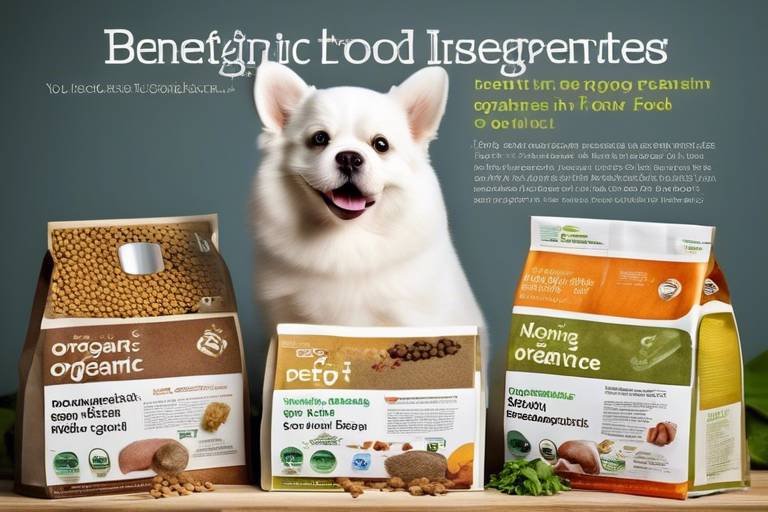Understanding the Role of Enzymes in Pet Nutrition
When it comes to our furry friends, we all want the best for them, right? Just like humans, pets need a balanced diet to thrive, and that's where enzymes come into play. These tiny yet mighty proteins act as catalysts in various biochemical reactions within the body, making them essential for proper digestion and overall health. Understanding the role of enzymes in pet nutrition can help pet owners make informed decisions that contribute to their pets' well-being.
Imagine enzymes as the hardworking crew in a factory. Each enzyme has a specific job, breaking down food components into smaller, absorbable molecules. Without them, the factory would grind to a halt, and our pets wouldn't be able to extract the nutrients they need from their food. So, what exactly are these enzymes doing in our pets’ diets? Let’s dive deeper into their significance.
Enzymes can be categorized into different types based on their functions. For instance, digestive enzymes are crucial for breaking down food, while metabolic enzymes are involved in energy production and other vital processes within the cells. Each enzyme type plays a unique role in enhancing nutrient absorption and supporting overall health. This intricate dance of enzymes ensures that your pet gets the maximum benefit from their meals.
So, what are the benefits of including enzymes in your pet's diet? Well, they can improve nutrient absorption, reduce digestive issues, and even boost your pet's energy levels! Think of enzymes as the secret ingredient that can turn an ordinary meal into a nutritional powerhouse. By incorporating the right enzymes into your pet's diet, you can help them lead a healthier, happier life.
In the following sections, we will explore the various types of enzymes found in pet food, their specific roles, and how you can choose the right enzyme supplements for your beloved pets. Get ready to unlock the secrets of pet nutrition and discover how enzymes can make a real difference in your pet’s health!

The Basics of Enzymes
Enzymes are fascinating biological catalysts that play a crucial role in facilitating chemical reactions within living organisms. Think of them as the unsung heroes of the metabolic world, tirelessly working behind the scenes to ensure that everything runs smoothly. Without enzymes, many of the processes that keep our pets healthy would grind to a halt, much like a car without oil. They help break down food, convert it into energy, and assist in numerous other vital functions.
At their core, enzymes are proteins that speed up chemical reactions by lowering the energy required for those reactions to occur. They are highly specific, meaning that each enzyme is designed to catalyze a particular reaction or type of reaction. For pet owners, understanding how enzymes function can illuminate their importance in pet nutrition and overall health.
Enzymes can be split into two primary categories: digestive enzymes and metabolic enzymes. Digestive enzymes are essential for breaking down food into smaller, absorbable molecules, while metabolic enzymes facilitate biochemical reactions within cells, aiding in energy production and detoxification. This dual role highlights the significance of enzymes not just in digestion but also in maintaining optimal metabolic function.
Here’s a quick overview of how enzymes function:
| Type of Enzyme | Function |
|---|---|
| Digestive Enzymes | Break down food components for nutrient absorption. |
| Metabolic Enzymes | Facilitate biochemical reactions for energy and detoxification. |
In essence, enzymes are indispensable for the health and well-being of pets. They not only enhance the efficiency of nutrient absorption but also play a pivotal role in various physiological processes. Understanding these fundamental aspects of enzymes can guide pet owners in making informed decisions about their pets’ diets, ensuring they receive the right balance of nutrients for optimal health.
As we dive deeper into the world of enzymes, we will explore the different types found in pet food and their specific roles in promoting a healthy lifestyle for our furry companions. By recognizing the impact of these tiny but mighty proteins, pet owners can take proactive steps to enhance their pets’ nutrition and overall quality of life.

Types of Enzymes in Pet Food
When it comes to pet nutrition, understanding the types of enzymes present in pet food is essential for optimizing your furry friend's health. Enzymes are not just fancy science terms; they are the unsung heroes working tirelessly behind the scenes to ensure your pet's body runs smoothly. In the world of pet food, there are three primary categories of enzymes that play a significant role: digestive enzymes, metabolic enzymes, and food preservation enzymes. Each of these types serves a unique purpose, contributing to the overall health and well-being of your pet.
Digestive enzymes are perhaps the most well-known in the realm of pet nutrition. These enzymes break down the food your pet eats into smaller, absorbable molecules. Imagine a key unlocking a door; that's what digestive enzymes do for nutrients—they unlock the potential within the food, allowing your pet to utilize every bit of goodness. Without these enzymes, pets can struggle with nutrient absorption, leading to a host of gastrointestinal issues.
Next up are metabolic enzymes. Unlike their digestive counterparts, metabolic enzymes operate within your pet's cells. They are crucial for various biochemical reactions, including energy production and detoxification. Think of these enzymes as the little workers in a factory, ensuring everything runs efficiently and that your pet's body can make the most of the nutrients it absorbs. They help maintain optimal metabolic function, which is vital for your pet’s overall vitality.
Lastly, we have food preservation enzymes. These enzymes play a critical role in extending the shelf life of pet food. They help prevent spoilage and maintain the freshness of the ingredients, ensuring your pet gets the best quality nutrition. Without these enzymes, pet food could quickly become stale or unsafe to eat, which is something no pet owner wants to deal with!
In summary, the different types of enzymes in pet food are essential for:
- Breaking down food for better nutrient absorption.
- Facilitating energy production and detoxification.
- Preserving the quality and safety of pet food.
By understanding these enzymes and their roles, pet owners can make informed decisions about their pets' diets, ensuring they receive the best nutrition possible. So, the next time you’re shopping for pet food, remember that the enzymes included in the ingredients list are more than just a scientific detail—they are vital components that can significantly enhance your pet’s health and happiness.
Digestive Enzymes
Digestive enzymes are the unsung heroes of your pet's digestive system. They play a crucial role in breaking down food components into smaller, absorbable molecules, ensuring that your furry friend can efficiently utilize the nutrients from their diet. Without these enzymes, your pet might struggle to extract the energy and nutrients necessary for a happy and healthy life. Imagine trying to enjoy a delicious meal but being unable to digest it properly; that’s how your pet feels without adequate digestive enzymes!
These enzymes are produced naturally in your pet's body, primarily in the pancreas and the intestines. However, sometimes, especially in older pets or those with certain health conditions, the natural production of these enzymes can decline. This is where supplementation can come into play, helping to bridge the gap and improve your pet's overall digestive health.
There are several types of digestive enzymes, each with its unique function:
- Amylase: This enzyme is responsible for breaking down carbohydrates into simpler sugars. It’s particularly beneficial for pets consuming grains or starchy vegetables, as it enhances carbohydrate digestion and energy utilization.
- Protease: Protease breaks down complex proteins into amino acids, which are essential for muscle development and overall health. This is especially important for pets on high-protein diets, such as active dogs or growing puppies.
- Lipase: Lipase helps in the digestion of fats by breaking them down into fatty acids and glycerol, ensuring that your pet can absorb the necessary fats for energy and healthy skin.
By incorporating these digestive enzymes into your pet's diet, you can help prevent common gastrointestinal issues such as bloating, gas, and diarrhea. Think of it as giving your pet a little extra help in digesting their food, making their meals not just a source of energy, but a source of joy!
Overall, understanding the role of digestive enzymes in your pet's nutrition can lead to better dietary choices. Just like how we take probiotics for gut health, your pets can benefit immensely from enzyme supplementation. It’s all about ensuring they have the best chance at a healthy, vibrant life!
1. What are digestive enzymes?
Digestive enzymes are proteins that help break down food into smaller, absorbable molecules, aiding in nutrient absorption.
2. Do all pets need enzyme supplementation?
Not all pets require enzyme supplementation; however, older pets or those with specific health issues may benefit from it.
3. How do I know if my pet needs digestive enzymes?
Signs that your pet may need digestive enzymes include frequent gastrointestinal issues, poor coat condition, or a lack of energy.
4. Can I give my pet human digestive enzyme supplements?
It's best to use enzyme supplements specifically formulated for pets, as human supplements may not meet their unique dietary needs.
5. How can I incorporate enzymes into my pet's diet?
You can add enzyme supplements to your pet's food or choose pet food that already contains added digestive enzymes.
Amylase
Amylase is a crucial enzyme in the digestive process, primarily responsible for breaking down carbohydrates into simpler sugars. This process is vital for pets, especially those whose diets include grains and starchy vegetables. Just think of amylase as a key that unlocks the energy stored in these foods, allowing pets to convert them into usable energy efficiently.
When pets consume carbohydrates, amylase acts like a diligent worker, breaking down complex starches into maltose and dextrin. These simpler sugars can then be easily absorbed by the intestines, providing the necessary fuel for daily activities. Without sufficient amylase in their diet, pets may struggle to digest these carbohydrates, leading to potential digestive issues like bloating or gas.
Interestingly, the production of amylase can vary among different species of pets. For instance, dogs generally produce amylase in their saliva, which means they start digesting carbohydrates right from the moment they chew their food. Cats, on the other hand, have lower levels of salivary amylase and rely more on their digestive systems to break down carbs. This difference highlights the importance of tailoring a pet's diet according to their specific digestive capabilities.
Incorporating amylase-rich ingredients into pet food can significantly enhance carbohydrate digestion. Foods such as sweet potatoes, peas, and certain grains can contribute to higher amylase levels, ensuring that pets can efficiently utilize the energy from their meals. Moreover, enzyme supplementation can be beneficial, especially for pets with sensitive digestive systems or those transitioning to a new diet.
Ultimately, understanding the role of amylase in pet nutrition is essential for pet owners who want to optimize their furry friends' diets. By ensuring that their pets receive the right balance of carbohydrates and supporting enzymes, owners can help promote better digestion, increased energy levels, and overall health.
- What is the role of amylase in pet nutrition? Amylase helps break down carbohydrates into simple sugars, making them easier for pets to digest and absorb.
- Can pets have too much amylase? Generally, pets produce the necessary amount of amylase for their dietary needs, but excessive carbohydrate intake without adequate enzyme support can lead to digestive issues.
- How can I ensure my pet gets enough amylase? Include high-quality, carbohydrate-rich foods in your pet's diet and consider enzyme supplements if needed.
Protease
Protease, a powerhouse enzyme, plays a pivotal role in the digestion of proteins, which are essential for your pet's health. This enzyme works by breaking down complex protein structures into smaller, more manageable amino acids. Think of protease as a pair of scissors that snips away at the tangled threads of protein molecules, making it easier for your pet's body to absorb and utilize these vital nutrients. Without sufficient protease, your furry friend might struggle to extract the full benefits from their protein-rich diet, leading to potential deficiencies and health issues.
But why is protein so important for pets, you might ask? Proteins are the building blocks of life; they contribute to muscle development, tissue repair, and even the production of enzymes and hormones. For active pets, especially those engaged in regular physical activities, a high-protein diet is crucial. Protease ensures that they can effectively break down and absorb these proteins, supporting their overall vitality and well-being.
Moreover, protease can also play a significant role in preventing gastrointestinal issues. When proteins are not adequately digested, they can ferment in the gut, leading to uncomfortable symptoms like gas, bloating, and diarrhea. By ensuring that proteins are broken down efficiently, protease helps maintain a healthy digestive system, allowing your pet to feel their best.
Incorporating protease into your pet's diet can be achieved through various means. Many high-quality pet foods already contain added protease, but in some cases, supplementing with additional protease can provide extra benefits. When considering supplementation, it’s important to consult with a veterinarian to determine the right dosage and product suitable for your pet's specific needs.
In summary, protease is not just another enzyme; it’s a crucial ally in your pet’s journey to optimal health. By aiding in protein digestion, it not only enhances nutrient absorption but also promotes a healthier digestive tract. So, next time you’re shopping for pet food or supplements, don’t overlook the importance of protease – it could be the key to unlocking your pet’s full potential!
Metabolic Enzymes
Metabolic enzymes are the unsung heroes of your pet's body, quietly working behind the scenes to ensure everything runs smoothly. Think of them as the busy workers in a factory, tirelessly facilitating biochemical reactions that are crucial for energy production, detoxification, and maintaining optimal metabolic function. Without these enzymes, your pet's body would struggle to convert the food they eat into usable energy, leaving them lethargic and unwell.
These enzymes play a pivotal role in various metabolic processes, including the breakdown of fats, carbohydrates, and proteins. For instance, when your pet consumes food, metabolic enzymes help to transform those nutrients into energy that fuels their playful antics and daily activities. This process is vital not just for energy but also for the synthesis of necessary compounds that support overall health.
One of the key metabolic enzymes is lipase, which is essential for breaking down fats into fatty acids and glycerol. This is particularly important because fats are a significant energy source for pets. Without adequate lipase, your furry friend may not be able to utilize these fats effectively, potentially leading to weight issues or deficiencies in essential fatty acids.
Another important player is amino acid decarboxylase, which assists in the conversion of amino acids into neurotransmitters—these are crucial for brain function and mood regulation. Imagine your pet feeling more energetic and happier, all thanks to the metabolic enzymes working hard to keep their systems balanced!
Moreover, the presence of metabolic enzymes can aid in detoxification processes. They help to break down and eliminate toxins that may accumulate in your pet's body from various sources, including environmental pollutants and even certain food ingredients. This detoxification is essential for maintaining your pet's health, preventing illnesses, and ensuring longevity.
In summary, metabolic enzymes are indispensable for your pet's health. They not only ensure that nutrients are effectively utilized but also play a critical role in detoxification and energy production. By understanding the importance of these enzymes, pet owners can make informed decisions regarding their pet's diet and overall well-being.
- What are metabolic enzymes? Metabolic enzymes are proteins that facilitate biochemical reactions in the body, crucial for energy production and detoxification.
- How do metabolic enzymes benefit my pet? They help convert food into energy, support detoxification, and maintain optimal metabolic functions, contributing to overall health.
- Can I supplement my pet's diet with metabolic enzymes? Yes, enzyme supplements can enhance your pet's nutrient absorption and overall health, but it's important to choose high-quality products.
- What should I look for in enzyme supplements? Look for products that specify the types of enzymes included, their source, and any proven efficacy in supporting pet health.

Benefits of Enzyme Supplementation
This article explores the significance of enzymes in pet nutrition, detailing their functions, benefits, and how they can enhance the health and well-being of pets through proper dietary integration.
Enzymes are biological catalysts that facilitate chemical reactions in the body. Understanding their structure and function is crucial for comprehending their role in pet nutrition and overall health.
Different enzymes serve various purposes in pet food, including digestive enzymes, metabolic enzymes, and food preservation enzymes. Each type plays a unique role in enhancing nutrient absorption and overall health.
Digestive enzymes break down food components into smaller, absorbable molecules. They are essential for pets to efficiently utilize nutrients from their diet and can prevent gastrointestinal issues.
Amylase is responsible for breaking down carbohydrates into sugars. Its presence in pet food can improve carbohydrate digestion and energy utilization, particularly in grains and starchy vegetables.
Protease aids in protein digestion by breaking down complex proteins into amino acids. This is vital for muscle development and overall health in pets, especially those with high protein diets.
Metabolic enzymes facilitate biochemical reactions within cells. They play a crucial role in energy production, detoxification, and maintaining optimal metabolic function in pets.
Supplementing pet diets with enzymes can lead to a myriad of benefits that significantly enhance their overall health and well-being. One of the most notable advantages is improved digestion. When pets consume enzyme-rich foods or supplements, they are better able to break down and absorb the nutrients present in their meals. This is particularly important for pets that may have sensitive stomachs or specific dietary restrictions. The enhanced breakdown of food components allows for the efficient absorption of essential vitamins, minerals, and other nutrients, ensuring that pets receive the necessary components for optimal health and vitality.
Moreover, enzyme supplementation can help reduce common digestive issues that many pets face. For instance, bloating, gas, and diarrhea are frequent complaints among pet owners. By incorporating enzymes into their diets, pets can experience a more comfortable digestive process, leading to fewer gastrointestinal disturbances. This not only improves their physical comfort but also contributes to a happier and more active pet.
In addition to these benefits, enzyme supplementation can also support the overall immune system of pets. A well-functioning digestive system is closely linked to a strong immune response. When pets are able to efficiently break down and absorb nutrients, their bodies are better equipped to fend off illnesses and infections. This holistic approach to pet health can lead to longer, healthier lives filled with vitality.
It's essential to note that not all enzyme supplements are created equal. Pet owners should carefully assess the quality of the products they choose. High-quality enzyme supplements are formulated with specific strains of enzymes that target the unique needs of pets, ensuring maximum efficacy. Additionally, consulting with a veterinarian can provide valuable insights into the best enzyme options tailored to an individual pet's dietary requirements.
- What are enzymes, and why are they important for my pet?
Enzymes are proteins that facilitate biochemical reactions in the body, playing a crucial role in digestion and nutrient absorption. - How can I tell if my pet needs enzyme supplementation?
Signs of digestive distress, such as bloating, gas, or irregular bowel movements, may indicate the need for enzyme supplements. - Are all enzyme supplements safe for pets?
Not all enzyme supplements are created equal. It's important to choose high-quality products and consult with a veterinarian. - Can enzyme supplementation help with my pet's allergies?
While enzymes can improve digestion, they may indirectly help with allergies by enhancing nutrient absorption and gut health.
Improved Nutrient Absorption
When it comes to our furry friends, ensuring they get the most out of their meals is crucial for their health and vitality. This is where enzymes come into play, acting as powerful allies in the digestive process. By supplementing your pet's diet with the right enzymes, you can significantly enhance their nutrient absorption. Imagine your pet's digestive system as a bustling marketplace; enzymes are the dedicated workers ensuring every stall is stocked and every product is accessible to shoppers. Without them, many essential nutrients would remain locked away, inaccessible to your pet's body.
Enzymes help break down food into smaller, more manageable components, making it easier for pets to absorb vital nutrients. For instance, when pets consume food rich in proteins, carbohydrates, and fats, enzymes like protease, amylase, and lipase get to work, breaking these macronutrients down into amino acids, sugars, and fatty acids, respectively. This process is akin to a chef meticulously preparing ingredients for a gourmet meal, ensuring that every flavor is released and every nutrient is available.
Research shows that pets on enzyme-enhanced diets experience a remarkable increase in nutrient absorption rates. For example, a study indicated that dogs receiving enzyme supplements had a 20% increase in the absorption of key vitamins and minerals compared to those on standard diets. This improvement is not just a number on paper; it translates to better energy levels, a shinier coat, and overall enhanced well-being for your pet. The benefits of improved nutrient absorption can be summarized in the following key points:
- Boosted Energy Levels: Pets are more active and playful when they absorb nutrients efficiently.
- Stronger Immune System: Enhanced absorption of vitamins and minerals leads to a more robust immune response.
- Healthier Skin and Coat: Proper nutrient uptake contributes to a shiny, healthy coat and reduces skin issues.
However, it's essential to choose the right enzyme supplements tailored to your pet's specific dietary needs. Not all enzymes are created equal, and the effectiveness can vary based on the source and formulation. Consulting with a veterinarian can provide insights into the best options for your pet's unique situation. Remember, just like a tailored suit fits better than off-the-rack clothing, personalized enzyme supplementation can lead to optimal health benefits for your beloved pet.
Reduction of Digestive Issues
When it comes to our furry friends, digestive issues can be a real pain—both for them and for us as pet owners. Imagine your pet feeling bloated, gassy, or even experiencing diarrhea; it’s not just uncomfortable for them, but it can also lead to a lot of worry for you. This is where enzyme supplementation can come to the rescue! By incorporating specific enzymes into your pet's diet, you can significantly reduce these common digestive problems. But how exactly do enzymes help?
Enzymes work by breaking down the food your pet consumes into smaller, more manageable molecules. This process is crucial because when food is broken down efficiently, it minimizes the chances of undigested food fermenting in the gut, which can lead to gas and bloating. For instance, digestive enzymes like amylase and protease play a pivotal role in breaking down carbohydrates and proteins, respectively. When these components are properly digested, it can lead to a smoother digestive process.
Moreover, when pets struggle with digestion, they often experience discomfort that can affect their overall mood and energy levels. Think of it this way: if you’ve ever had a heavy meal that left you feeling sluggish, you can relate to how your pet feels. By reducing digestive issues through enzyme supplementation, you not only enhance their nutrient absorption but also contribute to a happier, more active pet.
Here are some specific digestive issues that enzyme supplementation can help alleviate:
- Bloating: Enzymes can help prevent the buildup of gas in the digestive tract.
- Gas: By improving the breakdown of food, enzymes can reduce the fermentation process that causes gas.
- Diarrhea: Proper digestion leads to firmer stools and less frequent trips outside.
Incorporating enzyme supplements into your pet’s diet can be a game-changer. However, it’s essential to consult with your veterinarian before making any changes. They can guide you in selecting the right enzyme products tailored to your pet’s specific needs. Remember, a happy gut leads to a happy pet!
- What are enzymes? Enzymes are biological catalysts that help break down food into absorbable nutrients.
- How do I know if my pet needs enzyme supplementation? Signs may include digestive discomfort like bloating, gas, or irregular stools. Consult your vet for advice.
- Can all pets benefit from enzyme supplements? Yes, but the specific needs may vary based on the pet's diet and health status.
- Are all enzyme supplements the same? No, the quality and efficacy of enzyme supplements can vary significantly, so choose wisely!

Choosing the Right Enzyme Supplements
When it comes to for your furry friends, it's essential to take a thoughtful approach. Just like humans, pets have unique dietary needs, and understanding these needs is crucial for selecting the most effective enzyme products. The first step is to assess your pet's current diet. Are they thriving on their current food, or do you notice signs of digestive discomfort? Evaluating their health status can provide valuable insights. For instance, if your pet often experiences bloating or gas, it might be a signal that their diet lacks adequate digestive support.
Next, consider the specific types of enzymes that would benefit your pet the most. Different enzymes target different aspects of digestion. For example, if your pet's diet is rich in protein, a supplement high in protease could be beneficial. On the other hand, if they consume a lot of carbohydrates, look for products containing amylase. It's like fitting the right key into a lock; the correct enzyme can unlock the full potential of your pet's food.
Furthermore, not all enzyme supplements are created equal. The quality of the product is paramount. When shopping for enzyme supplements, look for reputable brands that provide transparency regarding their ingredients and manufacturing processes. Check for third-party testing, which can assure you that the product contains what it claims. A good supplement should list its enzyme activity levels on the label, which gives you a clearer picture of its potency. Remember, a high-quality enzyme supplement can make a world of difference in your pet's health.
Finally, it’s wise to consult with your veterinarian before introducing any new supplements. They can offer personalized advice tailored to your pet's specific health needs and dietary requirements. After all, every pet is unique, and what works for one may not work for another. Taking the time to choose the right enzyme supplements can lead to improved digestion, enhanced nutrient absorption, and a happier, healthier pet.
- What are enzymes, and why are they important for my pet?
Enzymes are biological catalysts that help break down food components into absorbable nutrients. They play a crucial role in digestion and overall health. - How do I know if my pet needs enzyme supplements?
If your pet shows signs of digestive discomfort, such as bloating or gas, or if they are on a diet that may lack certain enzymes, it might be time to consider supplementation. - Are all enzyme supplements the same?
No, enzyme supplements vary in quality and formulation. It’s essential to choose products from reputable brands that provide clear information about their ingredients and enzyme activity levels. - Can I give my pet enzyme supplements without consulting a vet?
While some supplements may be safe, it's always best to consult with your veterinarian to ensure they are appropriate for your pet's specific health needs.
Assessing Pet Dietary Needs
When it comes to ensuring our furry friends live their best lives, understanding their dietary needs is crucial. Just like humans, pets have unique nutritional requirements that can vary based on several factors such as age, breed, activity level, and health status. It's like trying to find the perfect outfit; what works for one pet may not suit another. So, how do we determine what our pets truly need in their diets?
First and foremost, it's essential to evaluate the current diet your pet is on. Are they eating a commercial pet food that claims to be complete and balanced? Or are they on a homemade diet? Each option can have its pros and cons. For instance, while commercial foods are formulated to meet nutritional standards, homemade diets can often lack essential nutrients if not properly balanced. A good rule of thumb is to consult with a veterinarian or a pet nutritionist who can provide insights tailored to your pet's specific needs.
Next, consider your pet's life stage. Puppies and kittens, for example, require more calories and nutrients for growth compared to adult dogs and cats. Senior pets, on the other hand, may need diets that are lower in calories but higher in fiber to aid digestion. It’s like adjusting a recipe based on the season; different times of life call for different ingredients!
Another factor to consider is your pet's activity level. An active dog that loves to run and play will need more energy-dense food than a couch potato. Similarly, pets with health issues such as obesity or diabetes may require specialized diets. Understanding these factors can help in selecting the right enzyme supplements that complement their dietary needs. For example, a dog with a high protein diet may benefit from additional protease to help break down those proteins effectively.
Furthermore, allergies and intolerances can drastically affect a pet's dietary needs. If your pet shows signs of digestive upset or skin issues, it might be worth exploring hypoallergenic diets or limited ingredient options. This is where enzyme supplementation can also play a role in easing digestion and nutrient absorption, making it easier for your pet to thrive.
In summary, assessing your pet's dietary needs is a multifaceted process that requires careful consideration of their diet, life stage, activity level, and any health issues. By taking the time to understand these factors, you can make informed decisions that enhance your pet's health and well-being.
- What are the signs that my pet needs a dietary change? Look for signs like weight gain, lethargy, digestive issues, or changes in coat quality.
- Can I give my pet enzyme supplements without consulting a vet? It's always best to consult a veterinarian before introducing new supplements to ensure they are appropriate for your pet's specific needs.
- How do I know if the enzyme supplement is of good quality? Look for products that have been tested for efficacy and are made by reputable manufacturers.
Quality of Enzyme Products
When it comes to choosing enzyme supplements for your beloved pets, quality is paramount. Not all enzyme products are created equal, and understanding the differences can significantly impact your pet's health and well-being. It's essential to look for products that have undergone rigorous testing and are backed by scientific research. This ensures that the enzymes are not only effective but also safe for your furry friends.
One of the first things to consider is the source of the enzymes. High-quality enzyme supplements often derive their enzymes from natural sources, such as plants or microorganisms, rather than synthetic alternatives. Natural enzymes tend to be more effective and better tolerated by pets. Additionally, check for the presence of a variety of enzymes in the product. A well-rounded enzyme supplement will typically contain multiple types of enzymes, including amylase, protease, and lipase, each serving a unique purpose in digestion and metabolism.
Another critical factor is the potency of the enzymes. Look for products that specify the enzyme activity levels, often measured in units such as FCC (Food Chemical Codex) units. This measurement indicates how effective the enzymes are at breaking down food components. A higher potency usually means better results in terms of nutrient absorption and digestive health.
Furthermore, consider the formulation of the product. Enzyme supplements come in various forms, including powders, capsules, and chews. Each form has its own advantages, but it’s essential to choose one that your pet will readily accept. For instance, if your pet is a picky eater, a flavored chewable might be more appealing than a powder that needs to be mixed with food.
Lastly, always check for third-party testing. Products that have been tested by independent laboratories often have a higher level of credibility. These tests can verify the enzyme activity, purity, and absence of harmful contaminants, providing peace of mind that you are giving your pet a safe and effective product.
In summary, when selecting enzyme supplements for your pet, prioritize quality by focusing on natural sources, potency, formulation, and third-party testing. By making informed choices, you can enhance your pet's health and ensure they thrive with the right dietary support.
- What are enzymes and why are they important for pets?
Enzymes are biological catalysts that help break down food into absorbable nutrients. They are crucial for digestion and overall health. - How do I know if my pet needs enzyme supplementation?
If your pet experiences digestive issues or if their diet lacks certain nutrients, enzyme supplementation may be beneficial. Consulting with a veterinarian can provide guidance tailored to your pet's needs. - Are there any side effects of enzyme supplements?
Generally, enzyme supplements are safe for pets. However, some pets may experience mild digestive upset when starting a new supplement. It's best to introduce any new product gradually. - Can I give my pet human enzyme supplements?
No, human enzyme supplements may contain ingredients that are not safe for pets. Always choose products specifically formulated for animals.
Frequently Asked Questions
- What are enzymes and why are they important for my pet?
Enzymes are biological catalysts that help speed up chemical reactions in the body. For pets, they play a crucial role in digestion and nutrient absorption, ensuring that your furry friend gets the most out of their food. Without sufficient enzymes, pets may struggle to break down their meals, leading to digestive issues and nutrient deficiencies.
- What types of enzymes should I look for in my pet's food?
There are several types of enzymes that can benefit your pet, including digestive enzymes like amylase and protease, which help break down carbohydrates and proteins, respectively. Additionally, metabolic enzymes support energy production and overall metabolic health. Choosing a pet food that includes these enzymes can enhance your pet's diet significantly.
- How can enzyme supplementation improve my pet's health?
Enzyme supplementation can lead to improved nutrient absorption, meaning your pet gets more vitamins and minerals from their food. It can also help reduce digestive issues such as gas, bloating, and diarrhea, resulting in a happier, healthier pet. Think of it as giving your pet extra tools to help them digest their food better!
- Are all enzyme supplements the same?
No, not all enzyme supplements are created equal. It's important to choose high-quality products that have been proven effective. Look for supplements that specify the types of enzymes they contain and their sources. This way, you can ensure your pet gets the maximum benefits from the supplements you choose.
- How do I know if my pet needs enzyme supplements?
If your pet experiences frequent digestive issues or if their current diet lacks enzyme-rich ingredients, they might benefit from enzyme supplementation. It’s always a good idea to consult with your veterinarian to assess your pet’s dietary needs and health status before making any changes.
- Can I give my pet too many enzymes?
While enzymes are beneficial, too much of a good thing can be harmful. Over-supplementation might lead to digestive upset or other health issues. Always follow the recommended dosage on the enzyme supplement packaging and consult your vet if you’re unsure about the right amount for your pet.



















